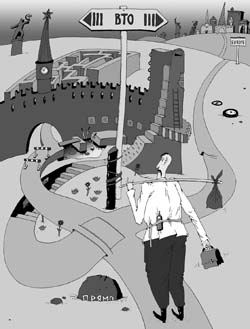Exports will double
This will be one of the results of free trade with Europe
The process of integrating with Europe is gaining momentum and increasingly perceived in Ukraine as a real factor of domestic economic growth. “The positive consequences of the potential creation of a free trade area are much broader than even Ukraine’s admission to the WTO,” Deputy Minister of the Economy Valeriy Piatnytsky declared during a discussion of the report “Prospects of Intensified Free Trade between the European Union and Ukraine.”
The paper, prepared by the Groupe d’Etudes Politiques Europeennes (Brussels), the Kiel Institute for World Economics, and the International Advanced Research Center (Kyiv), was commissioned by the European Commission in the context of the Ukraine-EU Action Plan. However, its findings are only recommendations for the Ukrainian government. The authors of the analysis (among them Ukraine’s Piatnytsky) stress that they are independent researchers, and that the European Union and the Ukrainian government may have their own views on the matter. EU membership and the creation of a free trade area with Europe requires further reforms from Ukraine in the legislative realm in order to adjust its laws to European standards, and the production of quality goods. This is the hardest part.
The fact that strategically important foreign investors are interested in Ukraine is no longer surprising. Metallurgical enterprises are being reprivatized, Ukrainian banks are being sold, and so on. Ukraine is becoming integrated into European and other markets. The authors of the report are convinced that Ukraine’s admission to the WTO will mean the implementation of the principle of nondiscrimination among WTO partners, the lowering of customs rates, abolition of quotas, openness secured in the service sector, the creation of customs procedures, and removal of non-tariff barriers that operate according to the principle of protecting national interests. In the economic context, this will bring Ukraine not only cheap energy imports, but also an opportunity to take advantage of the new steel boom in the world market. In other words, the Ukrainian economy will be diversified, and it will become more open and transparent.
The experts considered four theoretical scenarios for developing Ukrainian-EU relations. The first is the establishment of simple free trade. Experts believe this can be accomplished quite easily, but it will not be advantageous enough. The second one is the creation of more intensive free trade exchanges. This is harder to realize but it will bring more benefits. The third one is a customs union (as in Turkey) which the experts consider undesirable. The fourth one is complete integration into the markets (as in Norway), but this is practically impossible for Ukraine.
The experts favor another option: the signing of a more profound free trade agreement. If such an agreement were signed, it would be possible to implement the free capital and manpower movement principle. Reductions in non-tariff commodity trade restrictions could also be expected through the harmonization and/or mutual assessment of conformity to EU technical standards. Extending the services sector to all other sectors, and coordination of domestic market regulations with European and international standards also look realistic.
Such an agreement could help provide the conditions for accompanying measures, technological assistance, particularly investments to develop the infrastructure, education, and personnel training. Michael Emerson, project coordinator and senior CEPS analyst, believes that Ukraine can have a free trade area with both the European Union and Russia. He adds, however, that the guarantee must be that Ukraine stay away from a customs union with the EU and SES.
However, in order to receive all the benefits from deepened free trade, Ukraine must travel the long road of upgrading and reform. The quality of customs services must be increased twofold to eradicate corruption. Another necessity is conformity of Ukrainian industrial goods to EU standards. The financial sector must be separated from the government and monopolistic groups.
There are certain limitations in the energy sector in terms of joining the European energy system. Nevertheless, experts believe that the Ukrainian energy system can be connected to the European one. To do so, Ukraine must adopt world gas prices. This will be a heavy burden on energy-consuming industries. In the ecological sphere Ukraine will have to comply with the Kyoto Protocol, to mention just a few tasks on the list. The transition to a transparent and corruption-free level of economic management remains the number-one problem.
The fact that certain Ukrainian industries may be crushed by the signing of a free trade agreement has been repeatedly discussed. The low competitiveness of Ukrainian industries and services makes it impossible to predict which branches will require special care and protection. Sofia Munoz Albarran of the European Commission’s Directorate General notes that it is too early to say at this stage which industries will be most sensitive to the consequences of free trade.
However, Ms. Munoz believes that such a zone will embrace 90-95 percent of trade relations. What will be the consequences for Ukraine? Researchers estimate that one of the results will be the doubling of exports to the EU, a considerable increase in imports from the EU, and a 20-30% GDP increment in Ukraine.






